In this Article
- I Am Pregnant, Should I Eat Fish?
- Mercury in Fish
- How Much Fish Should you Eat when pregnant?
- Risks of Getting Too Much Mercury while Pregnant
- What to Do if You Ate High Mercury
- Health Benefits of Eating Fish during Pregnancy
- Fish you can eat in pregnancy
- Fish You Should Avoid when Pregnant
- Is Canned Tuna Safe in Pregnancy?
- Should I Eat Fish Caught in Local Waters?
- What Diet Should I Take Other Than fish, to Get Omega-3s?
- Tips To Prepare Fish Properly
You may read conflicting reports about eating fish during pregnancy which creates confusion about whether or not it is safe. However, fish has a lot of positives, and except for a few varieties of fish, its consumption is considered to be safe and nutritious during pregnancy.
I Am Pregnant, Should I Eat Fish?
This is a question that worries a majority of pregnant women. The answer is fairly straightforward – yes, you should. Of course, you will need to choose the fish carefully and limit your portions sensibly too. There is a wide array of nutrients essential for the early development of your baby and fish provides many of these nutrients in abundance. Fish have low levels of saturated fat but high levels of nutrients necessary for the developing baby, such as Vitamin D and protein, and this helps promote a healthy pregnancy. Your doctor will also encourage eating fish during pregnancy first trimester in particular, for the same reason.
Further, two essential Omega-3 fatty acids present in fish – EPA and DHA – are difficult to find in other foods but essential for the baby’s development. Hence, fish are considered a welcome addition to your diet during pregnancy.
Mercury in Fish
Mercury is not only found in water but also in the air that we breathe. However, due to rapid industrialization, more mercury is being released into the air by chemical industries, power plants, cement plants and other industrial manufacturers. Items of daily use like thermometers, fluorescent lights, thermostats, etc., also contain mercury and pollute the water when they are disposed of unchecked in rivers and seas. Bacteria convert the mercury settled in water into methyl-mercury. When fish swim in these waters and feast on other organisms, this mercury enters their body. However, the most worrying fact is that this mercury binds with the muscles of the fish and remains even when they are cooked.
Fish are a storehouse of many vital nutrients which a pregnant woman needs to foster a healthy foetus. However, many toxins and pollutants from the water bodies find their way into the fish that we eat and these fish when ingested can affect human health. Although small amounts of mercury may not have a major impact on our health, studies have shown that the neurological development of babies can be severely affected if the mercury levels remain high and unchecked. As a mother-to-be, you would want to eliminate the risk of mercury in pregnancy and therefore, it is best to stick to low-mercury fish during this period.
How Much Fish Should you Eat when pregnant?
So, what is the amount of fish you should consume during pregnancy? International agencies like FDA (Food and Drug Administration) and EPA (Environmental Protection Agency) recommend two or three servings, i.e., 8 to 12 ounces (226 to 340 grams), of low-mercury fish every week. Breastfeeding mothers should also follow the same instructions to give their babies the necessary nutrients.
Risks of Getting Too Much Mercury while Pregnant
The methyl-mercury from fish is absorbed by our body upon consumption, and it moves across the placenta to the baby. Even low levels of methyl-mercury can have an impact on the baby’s brain and nervous system. Important areas like vision, language, motor skills, and cognitive skills like attention and memory may be impacted. Therefore, it is important for pregnant women to monitor the kind of fish they are eating during this time.
What to Do if You Ate High Mercury
If you have unknowingly eaten fish that is laden with high mercury, do not panic. The first step is to stop any further consumption and inform your doctor about it. Your doctor could suggest chelation therapy by administering chelating drugs to help eliminate the metal from your organs. Chelation will help your body to relieve itself of mercury and reduce its effects too.
Health Benefits of Eating Fish during Pregnancy
There are some truly massive benefits of adding fish to the daily diet of a pregnant woman. These include:
- Fish are powerful sources of lean protein, which is an essential amino-acid that supports foetal growth. It helps to create the baby’s cells for hair, bones, skin, and muscles.
- Fish like salmon are a great source of DHA, an Omega-3 fatty acid, which is known to boost the baby’s brain growth and activity. The baby’s growth is highly accelerated during the third trimester and it is especially important to consume fish during this duration.
- A good supply of Omega-3 is helpful for pregnant women to enhance their baby’s memory development and also improve brain activity.
- The increased intake of DHA and Omega-3 fatty acids through consumption of fish is also recommended during pregnancy and post-pregnancy to battle mood swings and bouts of depression.
- If the would-be-mother suffers from hypertension, eating fish can lower blood pressure. A fish-rich diet reduces blood clotting and blood fat levels, which may lower the risk of cardiac arrest in pregnant women.
- Pregnant women who have a high fish intake along with adequate Omega-3, either through fish or other supplements, are exposed to a lower risk of preterm birth.
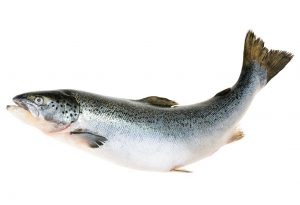
Fish you can eat in pregnancy
While eating out at restaurants or when cooking at home, you should keep in mind the list of safe fish during pregnancy. You can opt for salmon, shrimp, catfish, crab, cod, lobster, clams and trout. Halibut, shrimp, and snapper should not be consumed in more than 1 serving per week while the others mentioned above are considered safe to eat for pregnant women when limited to not more than 2-3 servings per week. The serving size can vary based on the type and preparation, but a single serving of fish is usually set at 3-6 ounces (85 to 170 grams). Make sure the fish variety is fresh and where possible ask for organically farmed fish.
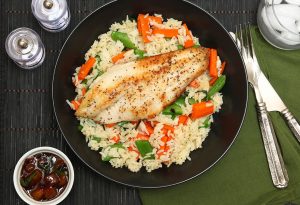
Recently, there have been conflicting reports about salmon and the high levels of PCBs (polychlorinated biphenyls) found in farmed salmon. PCBs are toxic chemicals that have also been linked to cancer. To be safe, consume wild salmon or organically-farmed salmon.
Fish You Should Avoid when Pregnant
The presence of mercury in fish is a great deterrent for fish lovers. Methyl-mercury, a neurotoxin, when consumed in high quantities can cause damage to the nervous system. During pregnancy, fish like shark, king mackerel, swordfish and tile fish should be a complete no-no. You should also avoid all kinds of raw fish including sushi, ceviche, and sashimi since they are highly prone to the risk of food-poisoning. Similarly, refrigerated smoked fish carries the risk of Listeria (a serious bacterial infection) and should be on the list of fish to be avoided.
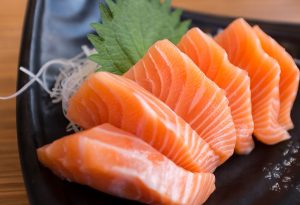
Avoid eating fish that has been caught recreationally and check the water information if possible before consuming it. You should remove the skin and excess fat before eating such varieties of fish.
Is Canned Tuna Safe in Pregnancy?
Canned tuna is termed as a high-risk fish. However, it can be eaten by pregnant women if it is not their main and only source of food, and the quantity is limited. An occasional serving of tuna will not cause harm to your baby. The commercial fishing industry is well regulated and therefore, canned fish which is available at restaurants and supermarkets is usually safe for consumption during pregnancy.
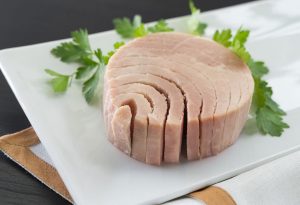
It is best to weigh the risks and benefits before eating any kind of fish or check with your doctor if you are worried about its safety for your baby. Avoid albacore tuna (also known as white tuna) since it is known to have higher quantities of mercury. Prefer light tuna over its other varieties.
Should I Eat Fish Caught in Local Waters?
Fish that is caught in local waters has been flagged unsafe. This is because the contamination of rivers and seas has grown with time and industries are known to release untreated chemicals into them. During pregnancy, it is best to avoid fish caught at places where there is little or no monitoring of the extent of mercury contamination.
What Diet Should I Take Other Than fish, to Get Omega-3s?
If you are amongst people who do not consume fish for taste or religious reasons and therefore worry about the intake of omega-3 during pregnancy, you need not despair. Apart from fish and fish oils, you can eat the following food items to compensate naturally:
- Walnuts are a rich source of Omega-3 fatty acids, and a handful of walnuts is great as an afternoon snack during pregnancy.

- Use olive oil while cooking food, especially for stir-fried or sautéed dishes, to balance your intake of Omega-3 fatty acids. However, do not overuse it since it is a calorie-rich oil.

- Flax seeds are another valuable source of Omega-3s. Crushed flax seeds can be added to yogurt or oats while having breakfast or an evening meal.
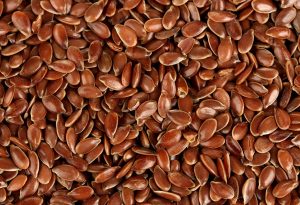
Tips To Prepare Fish Properly
Cooking fish in the right manner helps in reducing any kind of exposure to potential contaminants that could cause harm to you or your baby. Here are a few tips to prepare fish delicacies in a nutritious and tasty way:
- All seafood including shrimps, lobsters, and oysters should be cooked until they reach an internal temperature of 75°C to eliminate any contaminants.
- Oysters, clams, and mussels are cooked perfectly if their shells open. If not, do not consume them.
- Buying fresh, well-refrigerated sea food is always advised. Seal the fish in an airtight container and refrigerate it if you do not plan to use it immediately.
- Practise the use of different cutting boards for veggies and meat & fish for hygienic purposes.
- Raw food should be completely avoided as there is a higher possibility of contamination. Keep sushi and other raw fish out of your kitchen for a while.
Conclusion
It is best to eat recommended portions and quantities of fresh fish during pregnancy without overdoing it. Speak to your doctor and check if it is okay to eat certain fish in your condition. Remember, you and your baby need various nutrients at this time and fish can certainly provide them in abundance, as long as the necessary caution is observed.









